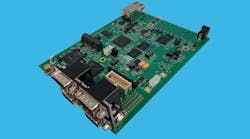Today, car manufacturers are struggling to stay ahead of a communications crunch. For years, companies have been adding features by adding electronic control units, or ECUs, to the car and connecting them to real-time networks. More than 100 of these modules are currently crammed in cars to manage windows, steering, signals, and other domains—that are all increasingly spewing out data and sharing it with each other and the cloud.
Most cars rolled out today are connected to the cloud and also support lane departure warnings and other advanced driver assistance systems (ADAS), all of which are adding to the data deluge. The data tends to go through network gateways serving as the car's central communications node. The gateways coordinate the CAN-FD, LIN, Ethernet, and other networks in the car, sharing data among ECUs and shooting it out to the cloud.
STMicroelectronics has rolled out a development tool for car makers that could ease information overload in cars. The tool is targeted at advanced automotive gateways that can not only transfer data around the car but also take advantage of it to support new features. These features range from detecting potential defects in the engine and other systems to sending upgrades—called over-the-air (OTA) updates—to cars remotely.
ST's tool is based on its ASIL-B Telemaco3P microprocessor (MPU) and ASIL-D Chorus microcontroller (MCU), the company said. The Chorus MCU supports real-time secure networking through its vast range of interfaces, including ports for CAN and Ethernet. The Telemaco3P MPU expands the computational power of the gateway with its Cortex A7 CPUs that support the Posix OS and are protected by a hardware security module.
The board—the Smart Gateway Platform (SGP)—incorporates interfaces to CAN-FD, the core network connecting electronic functions in the car, and Ethernet, which offers the real-time networking needed to handle the data from cameras, radar, and sensors. It also supports LIN—used to run communications for mirror, window and seat controls—and FlexRay ports—which has faster performance than CAN but slower than Ethernet.
The prototyping tool also has Mini PCIe and other expansion connectors for WiFi and LTE modules, which can be used to add cloud connectivity. ST is also giving customers a complete package of support tools, including hardware and software documentation, software drivers and flashers, and sample applications. Contact ST for pricing.
